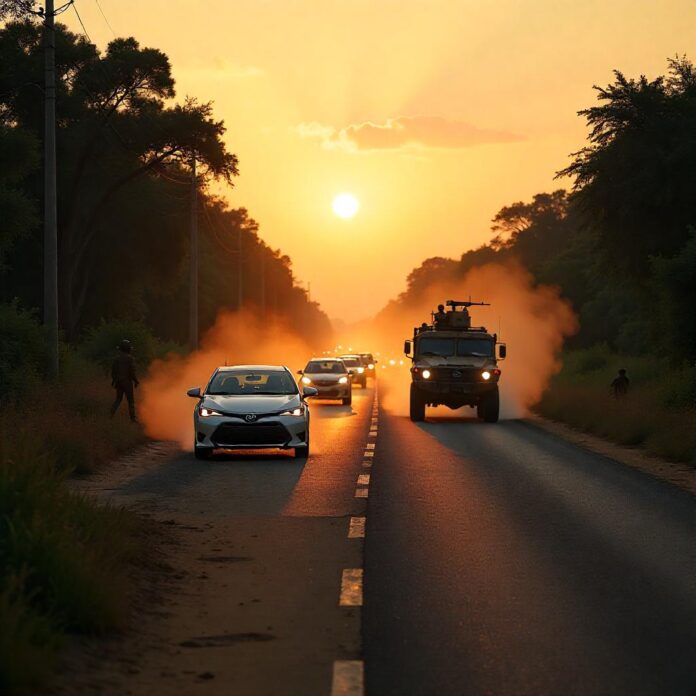You’re driving at dusk on the Kaduna-Abuja Highway—windows up, knuckles white on the steering wheel. Your eyes scan the dense foliage flanking the road, every shadow a potential threat. This 165-kilometer artery, linking Nigeria’s political heart to its northwest, is no longer just a transit route; it’s a gauntlet. Bandit kidnappings surged by 40% in early 2025, shattering a 10-month lull and igniting nationwide fury. Despite police denials of incidents, travelers now sprint through bushes to escape ambushes near villages like Katari. For Nigerians, this highway symbolizes a government’s broken promises and a people’s raw survival instinct.
Historical Descent into Chaos
The highway’s terror epidemic traces back to 2015, when bandits first weaponized its ungoverned forests. By 2022, it was branded Nigeria’s most dangerous road after a train attack killed passengers and kidnapped scores, forcing travelers onto the vulnerable highway. Police declared it “bandit-free” in April 2022—only for gunmen to abduct 20 travelers weeks later. This pattern of official denial versus brutal reality continues: Kaduna police recently dismissed reports of 150–200 kidnappings as fabricated, even as residents counted 85 abductions in a single January 2025 attack.
Bandit Tactics: Precision and Cruelty
Ambush operations unfold with military precision. Bandits divide into teams—some block highways with spike strips near Katari, while others raid villages simultaneously. Victims describe forced marches into forests like Rijana, where ransom negotiations occur via seized phones. One district head notes bandits rarely call for highway victims’ ransoms—proof of their disposable treatment. Ninety-one percent of attacks occur after 9 PM, exploiting patrol gaps. As one Katari resident testified: “They operated for 45 minutes. No one came.”
Economic Desperation Fuels Crime
With inflation soaring and food prices rising dramatically, ransoms averaging ₦5–50 million per victim fund entire criminal ecosystems. Bandits demand motorcycles, food, and cash—commodities more valuable than ever in Nigeria’s northwest. These are merchants of terror turning national despair into profit.
Security’s Fatal Flaws
Police and army posts dot the highway, yet bandits strike 500 meters from bases. Soldiers often arrive post-ambush, rescuing only the injured left behind. Despite laws enabling tracking, security agencies fail to trace kidnappers’ calls. Families negotiate ransoms while bandits taunt them from unlocated hideouts. Past initiatives like Operation Puff Adder collapsed when bandits “charmed the snake”—a local euphemism for bribing operatives.
Voices from the Valley
Frequent traveler Musa Usman describes vehicles as “sitting ducks” because potholes force speeds of 20 km/h—perfect for ambushes. Consultant Lami Yusuf now limits trips: “I only travel when imperative. My clients hear gunshots over Zoom calls.” A Katari cleric conducts weekly burials of unidentified bodies while officials dismiss his accounts.
Travelers’ Ultimatum
After a major Katari attack, protesters blockaded the highway, burning tires and chanting demands for military-escorted convoys every two hours. Their vision mirrors Kenya’s Garissa Highway system, where armored escorts slashed kidnappings by 80%.
The Bitter Realities
Deploying convoys would cost ₦2–5 billion monthly—a fraction of the ₦100 billion banditry industry but strained by Nigeria’s security budget. Convoys could become high-value targets, recalling the 2020 ambush of a governor’s convoy that killed 18 security personnel. Meanwhile, private armored cars costing ₦150,000 per trip shield the wealthy, leaving buses exposed.
Survival Protocol: Navigating the Highway
Preparation begins before ignition. Share live locations with three contacts via WhatsApp. Install emergency apps like Nigerian Police Rescue—its panic button alerts patrols. Use reinforced tires resistant to spike strips. Carry extra fuel; stops near Kateri are “ambush goldmines.”
On the road, embrace the Dawn Protocol: Move between 6:00–9:00 AM when only 9% of attacks occur. Join traveler collectives on WhatsApp groups like Kaduna-Abuja Road Safety to form impromptu convoys. Mask identities by avoiding luxury vehicles or official plates—studies show Toyotas attract least attention.
If captured, compliance saves lives. “Don’t stare. Hide jewelry in socks,” advises nurse Aisha Bello, who survived a 15km forest march. Seventy percent successfully negotiate ransoms downward—start at 10% of the demanded sum. Memorize rock formations and water sources; these become coordinates for rescue teams.
The Road Ahead
The Kaduna-Abuja Highway mirrors Nigeria’s existential crisis: a state struggling to protect citizens from entrepreneurial violence. Military convoys offer visceral relief, but lasting peace demands decentralized policing, technology-enhanced borders, and economic hope. As one traveler declared: “We don’t need press releases. We need to see our government on this road.” Until then, Nigerians will keep running through the shadows—praying for dawn.


